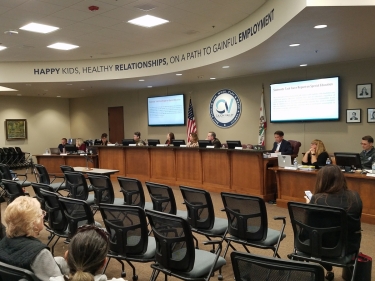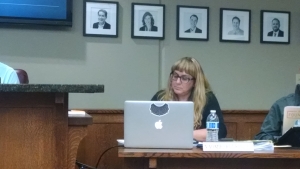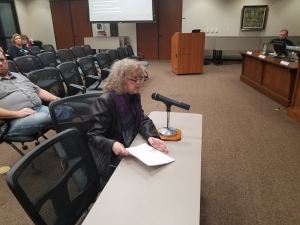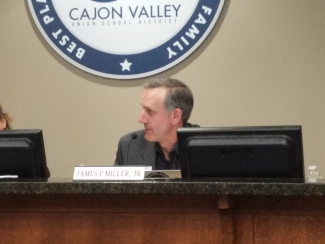 CalAware warns district after CVUSD destroys requested school board meeting recordings
CalAware warns district after CVUSD destroys requested school board meeting recordings
By Paul Kruze, Contributing Editor
Updated with CVUSD letter to CalAware)
March 28, 2019 (El Cajon) -- The Cajon Valley Union School District Board of Trustees voted 3-2 on Tuesday to change its policy on board meeting audio recordings. The action came after the district received a legal warning letter from Californians Aware (CalAware) regarding the district’s destruction of recordings from the Dec. and Nov. public meetings requested in a California Public Records Act request by East County Magazine in December.
Instead of destroying audio of board meetings after 30 days, the district will now keep them for one year and will make them available to the public on request on compact disc (CD). The measure, spearheaded by board trustee Jill Barto, was affirmed by Barto along with trustees Karen Clark-Meija and Jim Miller. Cajon Valley Union School District (CVUSD) trustees President Tamara Otero and Jo Alegria voted “no” on the new policy.
The letter addressed to Otero accused the CVUSD of violating multiple sections of the California Government Code relating to its refusal to permit inspection and copying of audiotape recordings made by the District of open and public meetings. The government act violated is more commonly known as the “Ralph M. Brown Act” which legally obligates government agencies and bodies to abide by specific rules regarding open meetings and access to public documents.
The Board made no specific mention of the CalAware letter at Tuesday’s meeting, but did send a response to CalAware the next day. Without admitting legal wrongdoing, the board affirmed in itsletter that it will cease, desist and refrain from repeating the challenged actions.
On Dec. 12, Paul Kruze requested an audio copy of the school board’s September, October, November, and December meetings. The board has maintained a policy of destroying audio recorded at its meetings after 30 days. Following its policy, however, ECM should have at least obtained the recordings from the board’s November and December meeting.
 ECM was verbally told by the district’s Executive Assistant, Naomie Rodrigues (photo, right) on Jan. 15 that due to holiday vacation closures, that it would only satisfy the publication’s request on Jan. 25. The Brown Act specifies that individuals asking for documents from public entities must have those requests fulfilled within ten days of receipt.
ECM was verbally told by the district’s Executive Assistant, Naomie Rodrigues (photo, right) on Jan. 15 that due to holiday vacation closures, that it would only satisfy the publication’s request on Jan. 25. The Brown Act specifies that individuals asking for documents from public entities must have those requests fulfilled within ten days of receipt.
The measure approved on Tuesday night still falls short of the meeting recording policy of other San Diego County school districts and San Diego County itself. The San Diego School District posts all its board of trustees meetings online along with meeting agendas and minutes and has done so in an archive since June 23, 2009. The San Diego County Board of Supervisors does the same and has an online video archive of its meetings available spanning back to July 24, 2007. (See ECM’s recent published survey of local school and government entity meeting archive policies here.)
The letter demands that the CVUSD has 30 days from the receipt of the letter to provide CalAware “with an unconditional commitment to cease, desist from, and not repeat the practices” as specified in the letter.
“A failure to do so will entire Californians Aware to file an action for declaratory judgment and injunctive relief and for attorney’s fees and costs,” the letter says. The letter also demands that the district provides copies of audio/video recordings of all meetings of the Council within the last 30 days, as well as all emails/documents concerning the practices noted.
Support award-winning nonprofit journalism in the public interest. Donate at www.eastcountymedia.org/donate. (Continue reading article below)
Also cited in the letter was a complaint about the same issue raised by CVUSD board trustee, Barto, when her requests for audio recordings from Nov. and Dec. were ignored by Rodrigues, and when she was “shut down” by Ortero at end of meeting board comments.
“I am elected by the people for the people to hold the district accountable and have transparency and accountability and to ask questions where needed to make appropriate decision that affect our schools and our community, and to withhold that information should be a direct violation.,” Barto says.
Barto states that at the Dec. meeting, she requested the tape of the Nov. meeting but accuses Rodrigues of making herself unavailable. “I had tried to go in, it was never convenient for them to meet with me, I had tried to make three or four different appointments...they were never available, and also I was dealing with family issues.”
ECM could not verify the exchange between Barto and Otero, as the recording of the meeting was destroyed by Rodrigues.
 ECM founder and publisher Miriam Raftery (photo, left) at a recent meeting said, in part, “The 30-day law on keeping recordings was written back when recordings were bulky to store. There is simply no reason with digital not to put them online. Unless you have something to hide or just don’t want the public to know something, why wouldn’t you do that?”
ECM founder and publisher Miriam Raftery (photo, left) at a recent meeting said, in part, “The 30-day law on keeping recordings was written back when recordings were bulky to store. There is simply no reason with digital not to put them online. Unless you have something to hide or just don’t want the public to know something, why wouldn’t you do that?”
A board member had previously contended that minutes were adequate records. But Raftery told the board, “Meeting minutes are fine. I have been to lots of meetings and I know that there are things that don’t get into the minutes. Not only is information not getting conveyed, but the tone of voice of the speaker if he is angry. Those are things the public have a right to know about,” she continued to say. (Listen all of Raftery’s comments here.)
In a sign that she was prepared to dig in her heels over the issue prior to Tuesday’s meeting on Mar. 12 and not agree to a new policy offering greater public access to meeting audio, Otero testily said, “I won’t be supporting this change. I was told in Sacramento that the standard protocol for elected officials is 30 days, per the government code.”
Otero continued, “My feeling is that the important work here is reflected in the minutes which represent the way we vote. Once a vote is called and decided we have an obligation to support the decision of the board. Personal conversations, tone of voice, etc., that leads to our decisions is irrelevant. Thirty days is ample time for anyone who desires to hear recordings to come into our office and do so. I will ask Naomi [Rodrigues] to allow for flexibility. So, those are my feelings on it and they are supported by government code.”
Board Trustee Karen Clark-Meija at the same meeting that any discussion about keeping recordings longer than 30 days “is a misuse of our time,” she said. “I believe in transparency and I believe that we are transparent. To say that we’re no transparent is an accusation that is unfounded. I wonder [where this discussion] comes from. I don’t understand why this has become so big. It is a mole hill becoming a mountain. It has become magnified. It has become misconstrued,” Meija said. She concluded that ECM’s coverage of the destroyed requested recording as “slandering our district.”
ECM’s records requests and the district’s denials are truthful and documented in e-mails, which CalAware’s general counsel Terry Francke reviewed.
 Mark Reagles, President of the California School Employees Association (CSEA) (photo, right) directly attacked ECM’s coverage of the destroyed board meetings recordings and attacked board trustee Barto for championing the issue, among other things.
Mark Reagles, President of the California School Employees Association (CSEA) (photo, right) directly attacked ECM’s coverage of the destroyed board meetings recordings and attacked board trustee Barto for championing the issue, among other things.
“I am livid that a Board Member would drag this district through the mud in an article with a crappy local magazine which is a slap in the face to every man and woman working this district. Minutes are not a secret, and we are a transparent district,” said Reagles.
He also slammed Barto, who spoke with ECM about the district’s failure to provide her with an audio recording of a public meeting. “Jill Barto you are no friend of labor. You are no longer backed by CSEA and you are no longer to attend any CSEA meetings or events.” (Hear audio of Reagles.)
 Although he did vote in favor of the policy change, CVUSD Board Vice-President and attorney Jim Miller (photo, left) referred to ECM at last month’s board meeting as “yellow journalists committing yellow journalism.” Miller failed to mention that when he ran unsuccessful for a superior court judge seat in 2012, ECM’s investigative report titled “Judicial Temperament” revealed that he had been removed as a judge pro tem by the Superior Court, or that ECM’s investigative findings led the conservative Lincoln Club to revoke its endorsement of his candidacy.
Although he did vote in favor of the policy change, CVUSD Board Vice-President and attorney Jim Miller (photo, left) referred to ECM at last month’s board meeting as “yellow journalists committing yellow journalism.” Miller failed to mention that when he ran unsuccessful for a superior court judge seat in 2012, ECM’s investigative report titled “Judicial Temperament” revealed that he had been removed as a judge pro tem by the Superior Court, or that ECM’s investigative findings led the conservative Lincoln Club to revoke its endorsement of his candidacy.
The California School Board Association (CSBA) was contacted for a comment about school board meeting media archive best practices recommendations. but did not respond to ECM’s request at publication time.
At Tuesday’s meeting, the board did not address an additional point raised by CalAware in its letter: “Preventing a trustee from asking questions of staff during a meeting concerning items on the agenda,” a right which the Ralph M. Brown Act protests.
Barto told Calaware that at November’s meeting, “I had asked some questions of David Miyashiro (Superintendent) about some agenda items and he never responded to me so during the meeting ; it was on an item on the agenda and I was requesting information and he made a public information announcement that unless Joe Alegria as current board president said that I could ask questions and use staff time to get answers about agenda items, he was not going to approve staff time to approve my request, whether for agenda items or off agenda items.”
The letter from Calaware directed the district to “cease, desist from, and not repeat the practices” listed – and to send the watchdog group’s attorney a copy of the audio recording from any meeting within the last 30 days.
Support award-winning nonprofit journalism in the public interest. Donate at www.eastcountymedia.org/donate.
As a public service, ECM has been creating our own copies of CVUSD board meetings after learning the board was not making them available as the law required:
February 26, 2019 (To be posted soon)
Follow Paul Kruze on Twitter and Facebook: @PaulKruzeNews









Recent comments